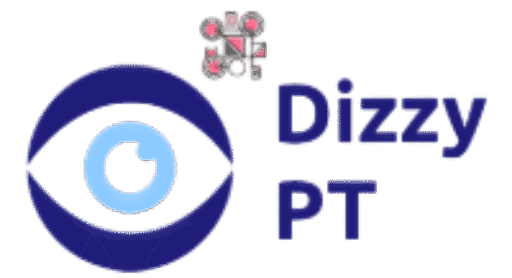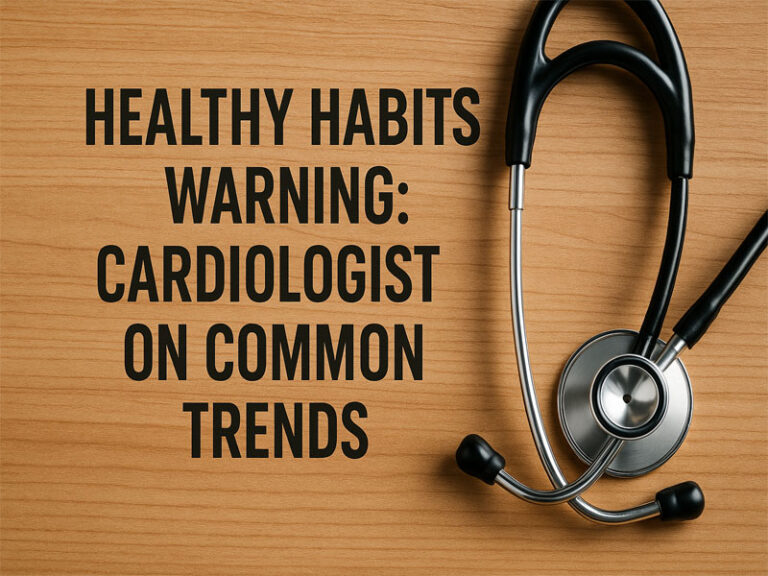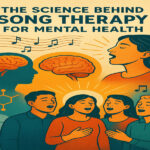Dizzy PT – In today’s world, health advice floods social media and wellness blogs. It’s easy to assume that every “healthy” habit is beneficial. However, a leading cardiologist has recently issued a Healthy Habits Warning. This highlights how some popular routines might do more harm than good. The warning draws from both clinical research and patient experience. Experts now stress that not all trends are as heart-friendly as they seem. The revelation has sparked debate in medical circles. Specialists are dissecting which habits truly support heart health and which might quietly undermine it.

Healthy Habits Warning: Over-Exercising and the Hidden Heart Risks
For decades, regular exercise has been praised as a cornerstone of a healthy lifestyle. Physical activity improves heart function and strengthens muscles. It also enhances mood and overall well-being. However, experts now warn that too much exercise can have adverse effects. Cardiologists caution against overtraining, especially in high-intensity regimens without proper recovery. Such habits may raise stress hormones and cause irregular heart rhythms. In severe cases, they can even lead to heart muscle damage.
A study highlighted by Dizzy PT revealed heart changes in some elite endurance athletes. These changes resemble those in patients with mild cardiac conditions. One example is atrial fibrillation, an irregular and often rapid heartbeat. This condition can lead to blood clots and stroke. Experts stress the need for moderation and balance in exercise habits. Rest days are as crucial as workouts for long-term heart health.
Furthermore, overexertion without sufficient hydration or electrolyte management can strain the cardiovascular system. Sweating excessively depletes sodium and potassium, minerals essential for maintaining heart rhythm. Without adequate replenishment, the risk of heart palpitations and muscle cramps rises significantly.
Skipping Meals: The Cardiovascular Consequences
One of the more surprising entries in the Healthy Habits Warning is intermittent fasting taken to extremes. While fasting has been linked to benefits such as improved insulin sensitivity and weight management, skipping meals frequently or fasting for prolonged periods can cause dangerous fluctuations in blood pressure and blood sugar.
Cardiologists point out that prolonged fasting may lead to low blood sugar, which forces the body to release stress hormones like adrenaline. Over time, this can increase heart rate and blood pressure, subtly taxing the cardiovascular system. For individuals with preexisting heart conditions, the risks multiply.
Many followers of intermittent fasting also consume large, calorie-dense meals after breaking their fast. This can cause sudden spikes in blood pressure and cholesterol levels, especially if the meal is high in saturated fats. According to the Dizzy PT report, such habits could increase the likelihood of developing arterial plaque—a key contributor to heart disease.
Read more: “Trump Meets Putin Global Attention on the Alaska Summit“
Healthy Habits Warning: Excessive Supplement Use
Supplements, from vitamins to herbal blends, have become a multibillion-dollar industry, marketed as a convenient way to improve health. Yet cardiologists warn that the “more is better” mindset can backfire. Some supplements, such as those containing high doses of vitamin E or omega-3 fatty acids, may thin the blood excessively, increasing the risk of bleeding. Others, like energy-boosting herbal products, may elevate heart rate and blood pressure.
Unlike prescription medications, supplements are not always subjected to rigorous testing or regulation. This means dosages and ingredient quality can vary widely, even within the same brand. Over time, chronic overconsumption may lead to heart rhythm disturbances, nutrient imbalances, and liver strain—factors that indirectly stress the heart.
The safest approach, cardiologists emphasize, is to get most nutrients from whole foods, turning to supplements only when medically necessary and under professional guidance.
Dehydration Disguised as Diet Discipline
Another underappreciated risk factor flagged in the Healthy Habits Warning is dehydration caused by excessive focus on calorie control. Many “clean eating” plans encourage reducing liquid calories, which often leads people to cut back on smoothies, juices, and even water intake without realizing it. Chronic low hydration thickens the blood, forcing the heart to work harder to circulate oxygen and nutrients.
Dehydration also disrupts electrolyte balance, leading to dizziness, fatigue, and—in severe cases—low blood pressure and fainting. These symptoms may be dismissed as signs of “detoxing” or “adjusting” to a new diet when in fact they signal a cardiovascular strain.
Healthy Habits Warning: Overreliance on Low-Fat Diets
The low-fat diet trend, once championed by public health campaigns, is being reexamined in light of new evidence. While cutting back on unhealthy fats can support heart health, eliminating fats entirely deprives the body of essential fatty acids necessary for hormone production, brain function, and cell repair.
Cardiologists note that healthy fats—found in avocados, olive oil, nuts, and fatty fish—play a critical role in lowering bad cholesterol (LDL) and raising good cholesterol (HDL). Without these fats, cardiovascular resilience can weaken, leaving the heart vulnerable to inflammation and oxidative stress.
Ironically, many low-fat products are high in refined carbohydrates and sugars, which can spike blood sugar and insulin levels. Over time, this can increase the risk of metabolic syndrome, a cluster of conditions that significantly heightens heart disease risk.
Misguided Stress Management Techniques
Mindfulness and stress reduction are vital for heart health. However, not all stress-relief strategies work equally well. Some popular practices, like extreme digital detoxes, can cause unintended effects. Complete withdrawal from social contact may trigger feelings of isolation. Isolation is a known risk factor for cardiovascular disease.
The Healthy Habits Warning notes that limiting stress is important for heart health. Human connection and social interaction are also vital. Activities such as group exercise, hobby clubs, or volunteer work provide relaxation. They also offer emotional support, which strengthens the heart’s resilience to stress.
Cardiologists’ Practical Recommendations
In light of these findings, cardiologists recommend the following steps for maintaining genuinely heart-healthy habits:
- Exercise in moderation – Aim for a balanced routine with rest days to allow recovery.
- Eat consistently – Avoid prolonged fasting unless guided by a healthcare professional.
- Hydrate adequately – Drink water throughout the day and replenish electrolytes after intense workouts.
- Incorporate healthy fats – Include foods rich in omega-3s and monounsaturated fats.
- Be cautious with supplements – Only use those recommended by a doctor.
- Manage stress mindfully – Combine relaxation techniques with positive social interaction.
By adopting these practices, individuals can avoid the pitfalls of trendy yet risky “healthy” habits and focus on genuinely protective measures.
The Broader Implications for Public Health
The conversation sparked by the Healthy Habits Warning goes beyond individual wellness, raising questions about how health trends spread and are validated. Social media platforms, influencers, and even well-meaning friends can unintentionally amplify habits that may carry hidden risks.
Public health officials say stronger education is needed to help people assess health advice critically. They also advocate better regulation of supplements and fitness programs. This would help ensure consumer safety. Medical professionals stress the value of personalized care tailored to each person’s health profile. Such an approach is the most reliable way to protect long-term cardiovascular health. Truly healthy habits balance benefits with sustainability. They avoid extremes and fad-driven practices. The cardiologist’s Healthy Habits Warning shows that even popular trends can have risks if misunderstood. By staying informed and consulting trusted medical sources, you can protect your heart. Listening to your body’s feedback ensures you enjoy the journey toward better health.



